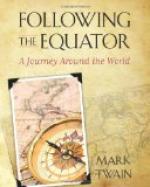“Many copies of Paul and Virginia are sold every year in Mauritius. No other book is so popular here except the Bible. By many it is supposed to be a part of the Bible. All the missionaries work up their French on it when they come here to pervert the Catholic mongrel. It is the greatest story that was ever written about Mauritius, and the only one.”
CHAPTER LXIII.
The principal difference between a cat and a lie is
that the cat has only nine lives.
—Pudd’nhead
Wilson’s New Calendar.
April 20.—The cyclone of 1892 killed and crippled hundreds of people; it was accompanied by a deluge of rain, which drowned Port Louis and produced a water famine. Quite true; for it burst the reservoir and the water-pipes; and for a time after the flood had disappeared there was much distress from want of water.
This is the only place in the world where no breed of matches can stand the damp. Only one match in 16 will light.
The roads are hard and smooth; some of the compounds are spacious, some of the bungalows commodious, and the roadways are walled by tall bamboo hedges, trim and green and beautiful; and there are azalea hedges, too, both the white and the red; I never saw that before.
As to healthiness: I translate from to-day’s (April 20) Merchants’ and Planters’ Gazette, from the article of a regular contributor, “Carminge,” concerning the death of the nephew of a prominent citizen:




